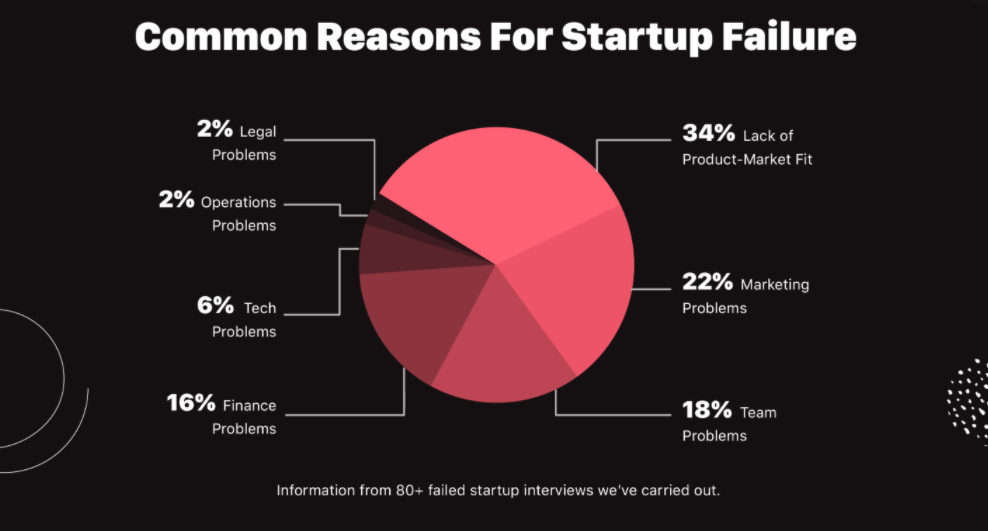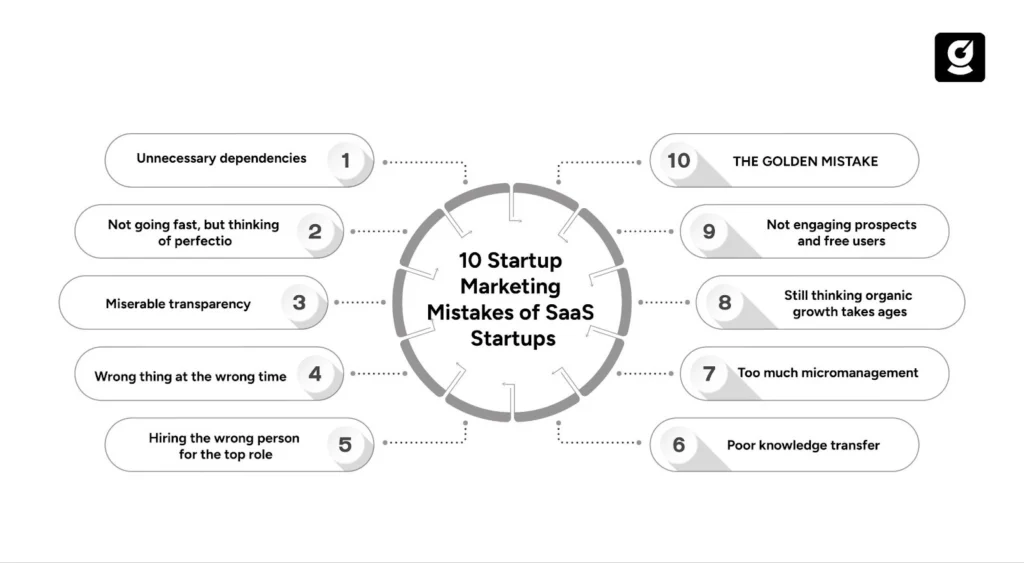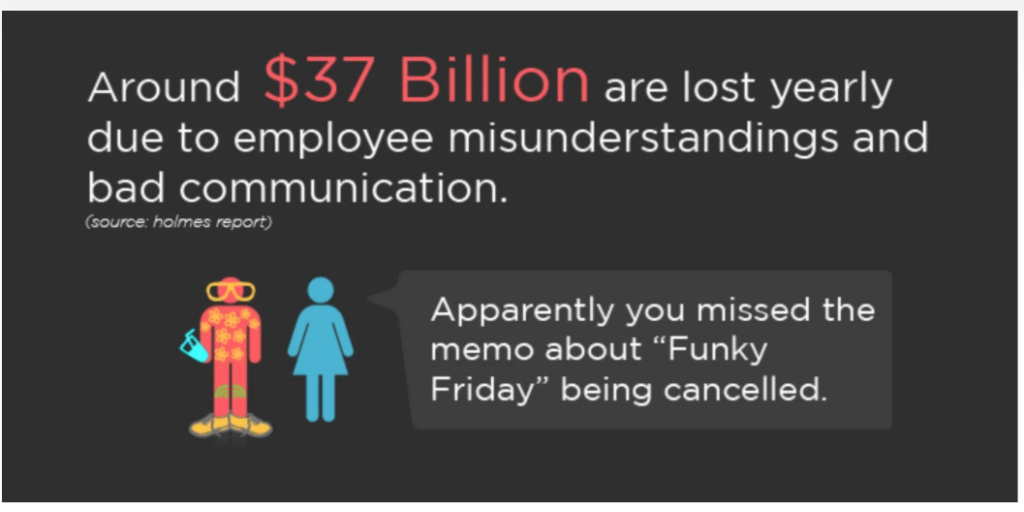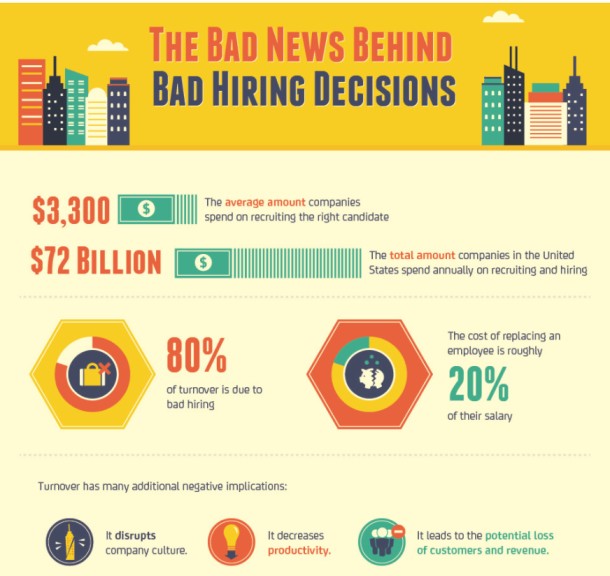Let’s say you build a product with years of passion, effort, and belief behind it, but have no clarity on who your target audience is or how to reach them. In that scenario, building a loyal customer base becomes impossible, and that is exactly where SaaS startup marketing fails.
A product is not truly complete until it reaches the hands of the right customers, and that only happens through effective marketing. The reality is blunt: saas marketing strategies have the power to make or break a startup in an extremely short span of time, and it cannot be treated as an afterthought.
That is why it is alarming, yet not surprising, that 22% of startups fail purely due to poor marketing decisions.

Many startups do not have a clear marketing goal, a defined mission, or a credible SaaS marketing team structure with ownership assigned to each function. Add to that a pile of overlooked execution gaps, and you have a perfect recipe for stalled growth and eventual failure.
Your team need not be the cause every time. More often, it is the way priorities are set, activities are executed, and objectives are defined that determine success or failure when you market your B2B SaaS startup.
With around a decade of experience in the startup ecosystem, here I’m trying to bring out the biggest marketing mistakes of startup entrepreneurs especially in the SaaS domain that could very well lead to the downfall of their institution.
10 Startup Marketing Mistakes That Cause SaaS Startups to Fail

1. Unnecessary Dependencies
A smooth workflow is the foundation of a successful saas marketing campaign or any business process, for that matter. It’s no secret! But multiply the above statement by 100, and you get to know how important it is for a start-up to ensure a hassle-free workflow.
As a startup, you need to grow consistently to establish your mark in the industry and when that’s the case you can’t afford many roadblocks in your work except in the initial setup and training phase.

Being a startup entrepreneur, you should be able to create a path for your marketing team that requires minimal dependency on you or any other team until really needed.
Always try to avoid that period of waiting for transitioning work from one to another by creating unwanted dependencies on someone or something.
Let’s take an instance that I often come across.
This is when I used to provide content marketing services to a client. As marketers, we know the best about the placement of blog posts, infographics, web content, etc., because we are the ones who curate it.
However, I was often not given access to CMS like WordPress to place the content the way it should be. The client’s team would place it themselves. I would send the content to their team and had to wait until it gets updated in the CMS.
Ultimately, it would cause a lot of dependencies and later confusion. Not only would the whole process get slowed down, but the marketing campaign as such would lose its effect. I would then have to sit on multiple calls with the client to set things the way they were initially planned, which would still not be as effective as it should have been.
Just imagine how much time and effort could have been saved if this dependency had been eliminated. It would have resulted in a seamless and productive workflow.
2. Not Going Fast Enough When You’re Too Obsessed With ‘A-Z’ Perfection
Entrepreneurs often get indulged in the race to make everything perfect on the very first try that they often forget the reality; there is nothing called perfect and definitely not the first time!
Most often, start-up owners spend days perfecting the marketing efforts, especially when it comes to saas content marketing. They want everything from A-Z of the content to be flawless and engaging for the audience.
Days and sometimes weeks are spent on rework and approval procedures of the content in order to make it perfectly desirable for the audience.
But here’s a question.
What if the audience doesn’t find it useful after all this work for perfection?
You would not only have lost a chunk of your precious time but also some potential customers to the competition.
The market is continuously evolving at a fast pace. What is desirable today, may not be so tomorrow. You need to match up to it if you want your business to thrive.
So, as a startup, you should be quite quick in rolling out your content and other marketing efforts. Don’t spend too much time perfecting it. The truth is that you don’t even know what is perfect until it reaches your target audience.

Make great content, review it once to eliminate basic errors, and roll it out immediately, whether you are doing it in-house or through content marketing services. Then, analyze how your audience responds and refine the content in the next iteration.
Marketing should be a timely, iterative process. Each cycle should help you produce a sharper, more effective version based on real reception, not assumptions, and that is how you actually get it right.
3. Not Giving A Shit About Direct Communication And Transparency
The driving factors for any marketing team to work like a well-oiled machine would be transparency and communication.
The team should be updated with all the information regarding each stage of marketing, starting from planning to designing to deployment.
For that to happen, there should be a proper and transparent system that facilitates communication within the team and outside it.
Sadly, not all start-ups understand the importance of communication in marketing.
While working for a start-up a few years back, I had to go through a lot of unwanted challenges due to the lack of direct communication. As you know, after the content is curated, it is transferred to the designer and then to the developer for its deployment.
Our marketing team could closely work with designers but had no direct communication with developers whatsoever. It was an unwanted barrier.
The designer would act as the middleman and pass my instructions to the developer, which used to lack clarity at times. After all, only a marketer can explain marketing tactics with utmost clarity.
So, most of the time, I was unaware of how it was being deployed until it was rolled out. Sometimes, the end result would be nowhere close to what I had in mind. We used to lose a lot of time in the process of explaining the intent and redoing it. It wasn’t just me whose time and efforts were wasted but the developers’ and designers’ too.

Well, this is more or less what happens at every start-up organization when the management fails to keep the doors of direct communication open.
There should be a sync and transparency while employees work together and that can be attained only if a smooth communication system is established between them.
4. Doing The Wrong Thing At The Wrong Time
This may be quite hard to digest, but the truth is that even today some startups work without a proper plan or strategy in place.
They come up with sudden ideas which is good. But the problem lies elsewhere.
Most of the time these ideas are implemented without strong research or planning.
That’s not all.
Many venture to carry out these ideas at the wrong time.
For instance, some entrepreneurs perform their outbound marketing procedures in a full-fledged manner even before the product and the site are completely set. But….
How can you expect people to be interested in your product without a credible site?
That being the case, the strategy not only fails to impress the targeted audience but also incurs a huge loss both in terms of time and money.
If the same time had been dedicated to researching the market and making a site elaborating on how the product solves customer pain points, the startupreneurs could have procured enough leads and conversions.
You really can’t afford many mistakes while running a startup.
Entrepreneurs need to have a clear vision and strategy in place. You should spend time researching your market, understand the behavior of your targeted audience and accordingly create a winning game plan!
5. Hiring The Wrong Person, Especially For The Top Role
You need to hire the right SaaS marketing agency or a fractional CMO who actually understands your stage, market, and growth goals, not just someone who looks good on paper.

When it comes to marketing, you need to hire someone with a vision and strategy to understand the targeted audience and curate lead-generation strategies. Needless to say, he/she must have experience in core marketing, especially when it comes to hiring a team lead.
A good marketing lead should know how to reach the right audience, address real customer needs, and bring out the best in every team member, whether this leadership comes from an in-house hire or fractional CMO services.
Now, when it comes to content marketing, startup management makes the mistake of blindly hiring candidates with language skills that only cater to a particular section of the audience. Mostly, they fail to see if the candidate can offer the right piece of content that addresses every section of the audience.
If the hired candidate cannot talk about the pain points of the audience, then the efforts will be futile despite his/her strong command over the language.
6. Giving The Least Priority To Knowledge Transferring
Startup entrepreneurs often miss the mark when it comes to knowledge transfer. They just brief the marketing team about the product/service to be marketed and expect them to create a successful growth marketing strategy with a rough idea of the product.
In some cases, the entrepreneurs do give a detailed class about the product or service but fail to keep the marketing team updated about the latest developments in their solutions.
If you fall in either of the categories, then it’s high time to change course because you are doing it all wrong. When half-baked knowledge is transferred your marketers will not be able to create convincing campaigns to lure customers.
Well, how can you expect the marketers to bring leads when they themselves aren’t sure about the product and its capabilities?

You should give a complete picture of your product/service with a demo to your marketers, and should also keep them updated if new features or integrations, etc. have been added, no matter how long it takes.
The marketer should know every single detail about the product. Only then can he/she effectively communicate and convince the targeted audience to purchase them.
7. Too Much Micromanagement Either Until You Fail Or Your Employees Quit
The start-up management often indulges in the micromanagement of marketing tasks which can lead to a result that might contradict your goals. Micromanagement and unnecessary interruptions not only kills your time but your teams’ as well.
For instance, many saas marketing companies conduct daily stand-up scrums, both virtually and physically, to know what tasks are being done and how. While scrums are good to keep yourself updated, conducting them daily may not be the wisest choice.
Taking updates from a large team every day consumes a lot of time and even exhausts the team because the entire process can extend up to an hour!
Imagine how many hours of productivity you lose in a month or year due to this?!!!
What you can do is conduct a scheduled, weekly scrum to discuss all tasks in detail and have daily virtual chat standups in Slack, Microsoft Teams, or Google Chat to see how your team is progressing every day. This can save a lot of time and improve productivity.
Take a look at this daily standup chat:

8. Living In The Previous Generation And Still Thinking Organic Growth Takes A Lot Of Time
It’s surprising that some startup founders still hesitate to adopt organic growth marketing, even though it is one of the most effective approaches in today’s marketing landscape. Instead, many continue to rely heavily on traditional outbound methods, including cold email outreach, while keeping organic marketing at bay because it appears slower.
If that’s the case, I would call it one of the worst decisions. Well, I’m not asking you to stop your outbound marketing efforts.
To run outbound campaigns, you need to find the right channels where you can meet your target audience. Since that’s the scenario, you’ll have to either reach out to them through the same channel or via email.
If it’s email, you’ve to spend on the lead generation process, and again it’s a time-consuming procedure.
The worst thing about outbound marketing is that you’ve to do the same processes over and over again for the same stagnant results that are limited to a particular time period.
If you want more results, you need to increase the number of reachouts. There are no exponential growth chances as such in this. If you do more, there’s a probability to get more.
Here are some insights to open your eyes!
Check out this calculation if you still weigh outbound over organic marketing:
| Outbound Expense | Email opens/5000 leads | Website visits | Signups |
| $1000/month | 1250/month | 250-300/month | 10-15/month |
NB: I assume that this expense includes the cost of a Market Research Analyst, a Lead Generation Tool, and an Email Marketing Tool.
Average outbound expense per month = $1000
Average leads generated per month = 5000
Average website visits generated per month = 250-300
Average signups generated per month = 10-1 5
This goes consistent. No growth at all!
If you want more signups, you need to increase the budget or add more resources.
And here’s the chart of content marketing:
| Month | Content Marketing Expense | Website visits | Signups | Conversion rate |
| Month 1 | $1000 | 0-100 | ||
| Month 2 | $1000 | 500-1000 | 5-10 | 1% |
| Month 3 | $1000 | 750-1500 | 12-22 | 1.5% |
| Month 4 | $1000 | 1000-2000 | 20-40 | 2% |
| Month 5 | $1000 | 1500-2500 | 37-62 | 2.5% |
| Month 6 | $1000 | 2000-3500 | 60-105 | 3% |
NB: Website visits, signups, and conversion rates are our assumptions based on our experience, certain criteria, and research. It may vary from domain to domain.
You might have noticed that content marketing takes time to show some results, and the conversion rate looks very low initially.
However, as we add more quality content such as blogs, case studies, e-guides, the credibility of the website improves and in turn boosts the conversion rate.
To make this work, you need to identify the right channels for your business and start repurposing content across them, whether through communities, partnerships, or even a LinkedIn outreach agency for B2B SaaS that can place your content directly in front of decision-makers.
I guess you must have realized by now that content marketing is the best marketing initiative for any B2B business as it is the least expensive long-term marketing strategy.
It makes sure you stay prominent in the game by enhancing your visibility to a wider audience enabling more visits and conversions. Also, the results are not limited to a particular time period, it will keep increasing until you delete the content.
Here’s a tip.
For the best results, combine your outbound marketing services with organic marketing initiatives to build both immediate traction and long-term growth.
For instance, when you send outbound emails you can mention and link case studies, blog pieces, ebooks, etc. in the content. This will add credibility to your pitch and make conversion a lot easier.
Now say, after going through all these benefits, do you really want to avoid content marketing?
9. Not Even Engaging With Your Prospects And Free Users
Lead nurturing is one of the most important components that complete your marketing strategies. Unfortunately, some startup entrepreneurs don’t spend enough time, money, or effort on lead nurturing.
I know many startupreneurs who would bring a sudden halt to their lead nurturing programs when they get a few prospects. That is one of the biggest blunders that you could do.
Firstly, you need the prospects, not vice-versa. Rarely do prospects come back to you for the product. You should approach them.
Secondly, do not forget about the fierce competition in the market. If you are planning to discontinue your lead nurturing practices, remember one thing. There is a whole group of competitors trying to win potential customers! You may have all the best features in your product and a competitive price to go with but wouldn’t have customers without nurturing your leads.

Make sure to engage and nurture your leads at every phase of the sales funnel. Strategize a drip campaign, forward newsletters, send follow-up emails at significant intervals of time, or send automated emails every time a prospect signs up with your platform, etc.
All these processes convey a sense of importance to the prospects, which increases the chances of conversion. In short, the more you nurture your prospects, the more are the chances of converting them.
10. Sitting Back, Relaxed, And Thinking Everything Will Be Taken Care Of By The Marketers You Hired (The Golden Mistake)
Running a growth marketing agency, I shouldn’t have told you this. 😀 But yes, sorry to burst the bubble!
Things don’t work that way because it’s your product and you know it better than anyone on the planet. So you’re the person who knows the products’ strengths really well and how it adds value to someone who uses it.
It means that you should involve and invest some time and effort in order to shape up your marketing team, be it an agency or an in-house team.
“Involvement is key.”
Without involving in the process and pitching in your contributions, you’ll not get the best output from your team, no matter how skilled they are.
An average team could fail, and maybe a good team can bring some output, but either way, you wouldn’t get a chance to explore the potential areas if you don’t give an inside-out
demonstration about your product or tell them what exactly you want and hope to achieve.
Initially, you should provide them enough product tours and knowledge transfers. You can schedule weekly catch-ups and ideate strategies together with the team. That one step can definitely help to level up your marketing.

Once the team is set and gets a hang of things, it will be taken care of by itself. And then, all you’ll have to do is check the progress once in a while and share your ideas.
Anyhow, do keep yourself involved in the marketing efforts. Marketing is as important as building a product, so you must be a part and parcel of it.
Conclusion
There is no rule saying that the best product or service wins the market. Because even if you have a great product or service in the kitty, you need good marketing initiatives to reach out to your target audience. Only then will your prospects know about the existence of your product and give it a try.
Obviously, every single startupreneur wants to do aggressive marketing. Unfortunately, knowingly or unknowingly, they make the common mistakes mentioned above that kill the potential of the startup’s speedy growth. Sadly, all this ends up in the blame game!
Such incidents can only be ironed out by having deep knowledge in your market niche, and the leadership/expertise of a marketer who is a jack of all trades and knows marketing end-to-end.
So, want to avoid the mistakes and take your product to the next level of growth?
A skilled team is all set to be an integral part of your startup-growth.
From demos to product and engineering meetings, our team will be involved in every major development cycle of your product that you’ll not even miss having an in-house marketing team!
Being a 100% client’s agency, we do not believe in outsourcing and work as a team for the end-to-end marketing of your product.
So, hope on a call, and let’s set up the right product-led growth marketing strategy for you.

FAQ
What content marketing mistakes does every SaaS startup make?
A major content marketing mistake SaaS startups make is chasing traffic over outcomes, producing blogs or posts that get page views but don’t support conversions or sales. Other common errors include ignoring how content supports the buyer journey, creating material that’s disconnected from sales needs, and failing to measure the right success metrics.
Is Growth.cx a full-service SaaS marketing agency?
Yes, growth.cx operates as a full-service SaaS marketing agency, handling everything from strategy and content marketing to outbound campaigns and lead nurturing. Their approach combines organic marketing, AI SEO, content marketing, and targeted outreach to help SaaS startups scale efficiently. By integrating services like fractional CMO support and campaign execution, they ensure startups have both strategic guidance and hands-on implementation.


